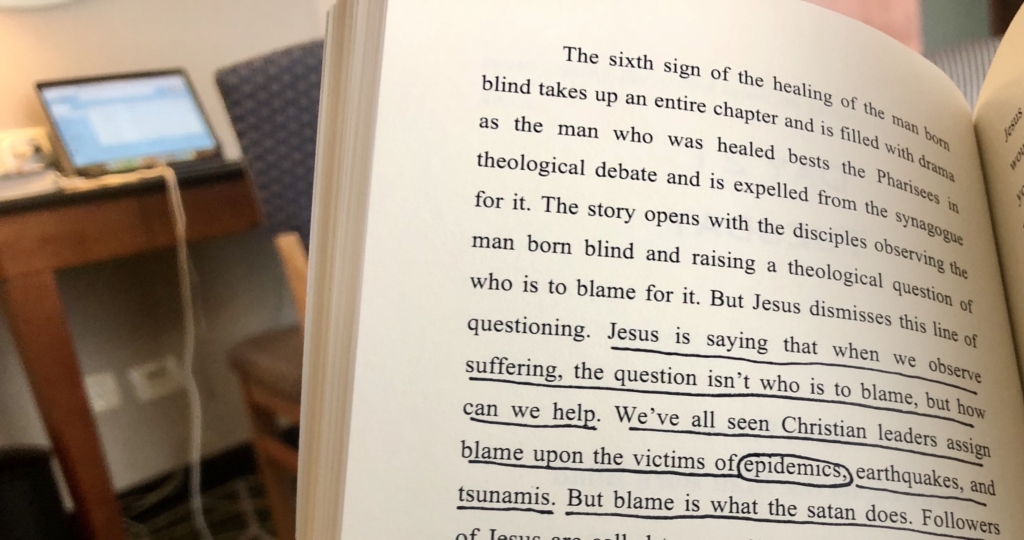The Sixth Sign and Epidemics

Shalom from Jerusalem.
Today’s Lenten reading from The Unvarnished Jesus seems particularly apropos, so I thought I would share it here.
BZ
LENT Day 21 (Tuesday)
John 9:1–41
Jesus Heals the Man Born Blind
John constructs his Gospel around seven signs: the water turned to wine at Cana, the healing of the royal official’s son in Capernaum, the healing of the lame man at the pool of Bethesda, the feeding of the five thousand at the Sea of Galilee, Jesus walking on water, the healing of the man born blind, and the raising of Lazarus from the dead. (And then there is the surprise eighth sign of Jesus’ resurrection that marks the beginning of a new creation.) John doesn’t talk about miracles, but signs. These signs are intended to point us to something significant about Jesus and his ministry.
The sixth sign of the healing of the man born blind takes up an entire chapter and is filled with drama as the man who was healed bests the Pharisees in theological debate and is expelled from the synagogue for it. The story opens with the disciples observing the man born blind and raising a theological question of who is to blame for it. But Jesus dismisses this line of questioning. Jesus is saying that when we observe suffering, the question isn’t who is to blame, but how can we help.
We’ve all seen Christian leaders assign blame upon the victims of epidemics, earthquakes, and tsunamis. But blame is what the satan does. Followers of Jesus are called to co-suffering love, not theological stone throwing. So Jesus instructs his disciples that when we observe suffering, it’s not an opportunity to assign blame, but an opportunity to do the works of God by helping to heal, restore, and alleviate suffering. Blame is the devil’s game — love is the high calling of the Christian. As Hans Urs von Balthasar said, “Love alone is credible; nothing else can be believed, and nothing else ought to be believed.” And this brings us to the main point of the sixth sign.
The meaning of the sign is made explicit at the end of the story. Look at the last verse of the chapter as Jesus says to the Pharisees, “If you were blind, you would not have sin, but now that you say, ‘We see,’ your sin remains.” There is an innocence in admitting that we are too blind to pass judgment on others. We don’t have to have an opinion on everything, especially when the question is who is to blame. It’s enough for us to say, “I don’t know who is to blame, I’m just here to help.” But when we claim to have 20/20 vision in judging the sins of others and assigning blame, our own sin remains. This is the sin of Job’s friends. They couldn’t resist the temptation of trying to explain what had happened by blaming Job. The book of Job is a study in the seductive cruelty of blaming the victim. The lesson we should learn from the story of Jesus healing the man born blind and the Pharisees’ reaction to it is that we should acknowledge our own blindness and let Jesus be both healer and judge.
Lord Jesus, we confess that we are too blind to pass judgment on others, so we turn away from seeking to blame and turn toward trying to love. Help us, we pray. Amen.